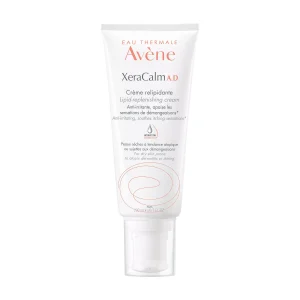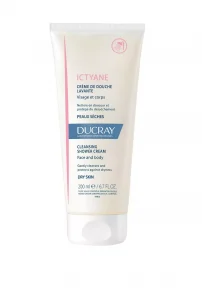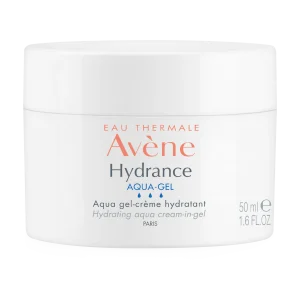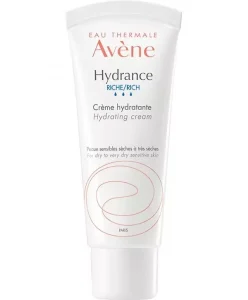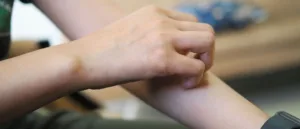
You may have an itch that needs scratching or a tickle on your back that you can’t reach. It is often difficult to pinpoint the exact cause of this itch. It can be as simple as the clothes you are wearing. But it can also be a symptom of something more serious, such as a rash or illness. So mosquito bites, chickenpox, and poison ivy aren’t the only causes of itching. Learn about other possible causes of your itch and ways to relieve it in this article from The Dermo Lab in collaboration with the dermatologist Dr. Dalia Ismail.
According to Dr. Dalia Ismail, there are many reasons why your skin may be itchy, from everyday occurrences such as dry skin or insect bites to more serious underlying conditions such as liver disease, kidney disease, thyroid problems, nerve disorders, and more.
Let’s start by breaking down these reasons!
1- Itchy skin condition. There is a long list of skin conditions that can cause intense itching:
- Atopic dermatitis or eczema
- Chickenpox
- Folliculitis
- Foot and mouth disease
- Urticaria
- Psoriasis
- Neurodermatitis
- Ringworm
- Seborrheic dermatitis
- Shingles
How to get relief: To get relief, you need to know what skin condition you have. The best way to get an accurate diagnosis is to see a certified dermatologist.
If you have been diagnosed with eczema, it can be difficult to get relief from the itching. To help patients get relief, here’s what we recommend.
Because your skin is dry and itchy, it’s a good idea to apply moisturizers to keep it moist. Keeping your skin moisturized with a dense cream or ointment helps relieve irritation and soothe any flare-ups that may occur. It also keeps the itchy feeling at bay and prevents scratching. Itching can make your eczema worse.
That’s why we offer the best eczema creams to moisturize, strengthen and protect against flare-ups.
Eau Thermale Avène XeraCalm A.D Lipid-Replenishing Cream
Ducray Dexyane Anti-Scratching Emollient Cream
2- Insect bites. When a mosquito bites you, the cause of your itching is usually obvious and the itch tends to disappear quickly. When insects live on your skin or feed on you every night, the itching can be long-lasting and uncontrollable. Insects that can cause prolonged itching include bed bugs, lice, and mites (scabies).
How to get relief: It may be helpful to apply an antihistamine cream or a corticosteroid cream.
3- Very dry skin. Extremely dry skin can cause intense itching. It can be particularly severe in winter and in places where the air is dry. With age, it becomes even more common.
How to get relief: To relieve the itchiness of dry skin:
- Drink plenty of fluids to stay hydrated.
- Use a humidifier.
- Take a quick shower and don’t use very hot water.
- Use gentle, moisturizing cleansers.
When you have dry skin, it’s essential to find a gentle, non-comedogenic, moisturizing cleanser. The wrong cleanser can literally dry out your skin even more. That’s why we’ve gathered the most recommended facial cleansers for dry skin.
Eau Thermale Avène TriXéra Nutrition Nutri-Fluid Cleansing Gel
Ducray Ictyane Cleansing Shower Cream
- Use a moisturizer after your bath while your skin is still wet.
Moisturizers loaded with emollients help smooth the skin’s surface. They fill in the spaces between the skin cells where moisture has been lost.
You won’t have to worry about dry skin anymore if the following moisturizing products are looking out for you.
Eau Thermale Avène Hydrance Aqua-Gel
Eau Thermale Avène Hydrance Rich Hydrating Cream
4- Skin cancer. For many people, the only sign of skin cancer is a new or changing patch on their skin. Sometimes this spot also causes itching and may be the only reason a person notices the spot.
How to get relief: See a dermatologist to find out if you have skin cancer. If you have skin cancer, its treatment can make the itching go away.
5- Warning signs of disease in your body. Long-lasting itching can be a sign of several diseases, including:
- A blood disease
- Diabetes
- Kidney disease
- Liver disease
- HIV
- Overactive thyroid gland
Pruritus is common in people with diseases that affect the blood, such as Hodgkin’s lymphoma or cutaneous T-cell lymphoma. It can also be a sign of advanced kidney disease and often develops in people who are about to need dialysis or are currently on dialysis.
Itching is also common in people with liver diseases, such as hepatitis C, cirrhosis, or biliary obstruction.
How to get relief: Getting an accurate diagnosis and treatment can relieve itching. A dermatologist often plays a key role in diagnosing these conditions, as itching may be the only symptom.
6- Allergic skin reaction. Your skin can develop an allergic reaction to many substances such as nickel, which is found in many products you touch every day. Examples of products that contain nickel are cell phones, jewelry, eyeglass frames, zippers, and belt buckles.
Other substances that can cause an allergic skin reaction include nail polish, perfumes, shampoos, latex, and cement. If you develop an allergic reaction, you’ll probably get a rash and uncontrollable itching.
How to get relief: You need to find out the cause of your allergy so you can stop touching or using whatever is causing the itching. This can be difficult and often requires the help of a dermatologist.
7- Reaction to a plant or marine organism.
- Plants – Poison ivy is known to cause itching, but it is not the only plant that can do so. If you don’t know that a plant is causing your itching, it can last a long time.
- Marine life – You can also get itchy after being in the water, such as in an ocean, lake, or pond.
How to get relief: If you stay away from the plant or sea life that is causing your itch, the rash tends to go away on its own in a few days or weeks.
8- You are 65 years or older. As you age, your skin changes. At age 65, your skin is thinner and less moisturized, which can cause itching.
How to get relief: If the itching is due to dry skin, your dermatologist may recommend changing your skin care routine and using large amounts of moisturizer.
9- Medication or cancer treatment. Itching can be a side effect of taking certain medications, such as aspirin, strong prescription painkillers called opioids, and some blood pressure medications. It can also be a side effect of cancer treatment.
How to get relief: Ask the doctor who prescribed the medication or treatment if itching may be a side effect. If so, your doctor can give you tips that can help you reduce the itching and continue treatment.
10- Nerve problem. When a nerve isn’t working properly, it can cause itching. If a nerve is damaged due to disease or injury, you may also develop itching.
The diseases that can cause this type of itching are the following:
- Shingles
- Stroke
- Multiple sclerosis.
How to get relief: If you have severe itching, talk to your dermatologist, who can prescribe medication.
Dr. Dalia Ismail adds that certain foods can cause itching in some people, such as eggs, fish, cow’s milk, seafood, soy, nuts, and wheat. In addition, deficiencies in vitamins A, B, C, D, and E can also cause itching.
Dr. Dalia Ismail points out that itching becomes a concern if it affects your sleep cycle, your daily routine, or if it lasts longer than two weeks.
Despite how uncomfortable itchy skin can be, the good news is that most cases can be easily managed and even prevented. With a bit of knowledge about the causes and triggers of itchy skin, you can take proactive steps to keep your skin healthy and avoid unnecessary discomfort. So next time you’re scratching an itch, remember that you’re not alone and that there are solutions out there to help you feel your best!
